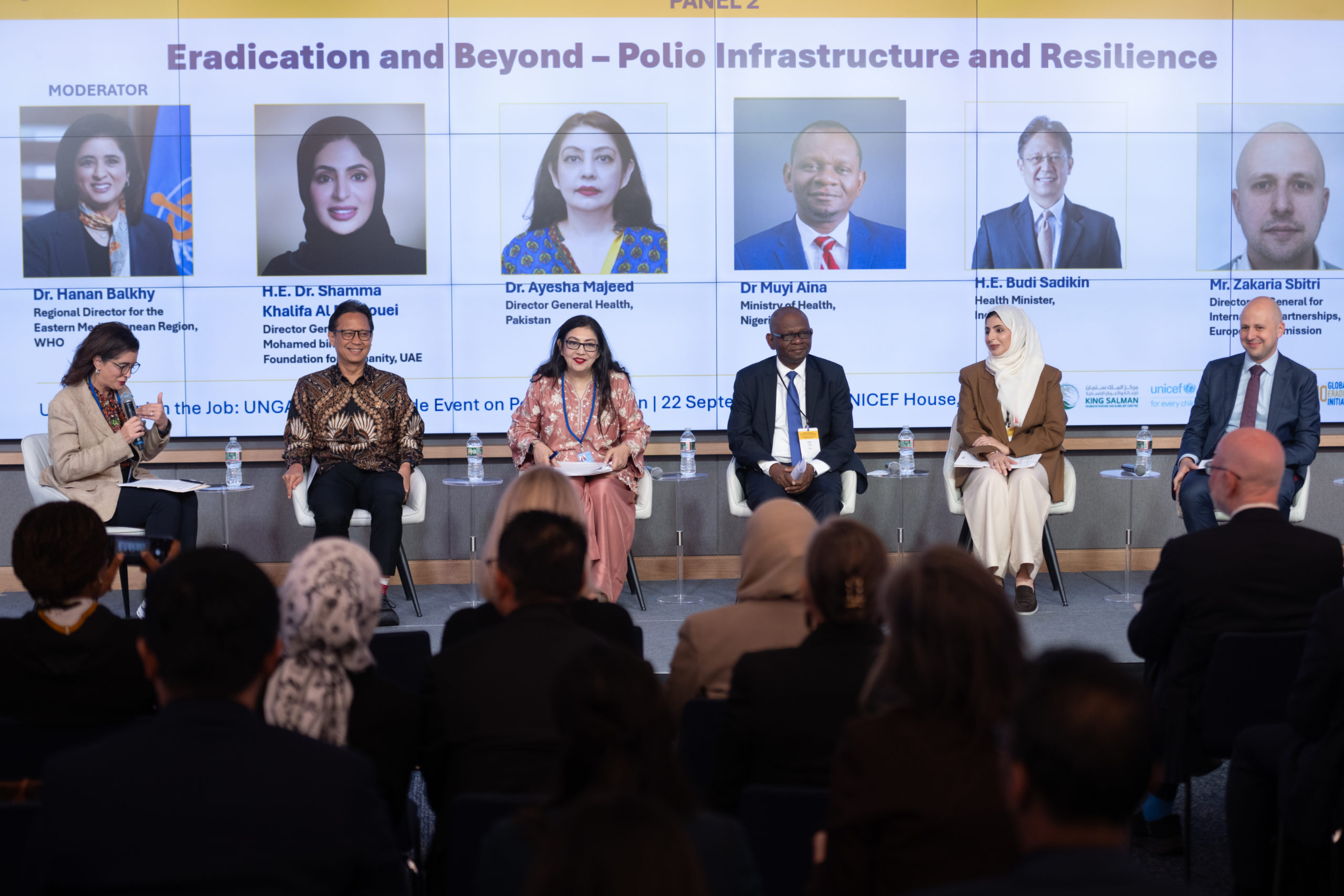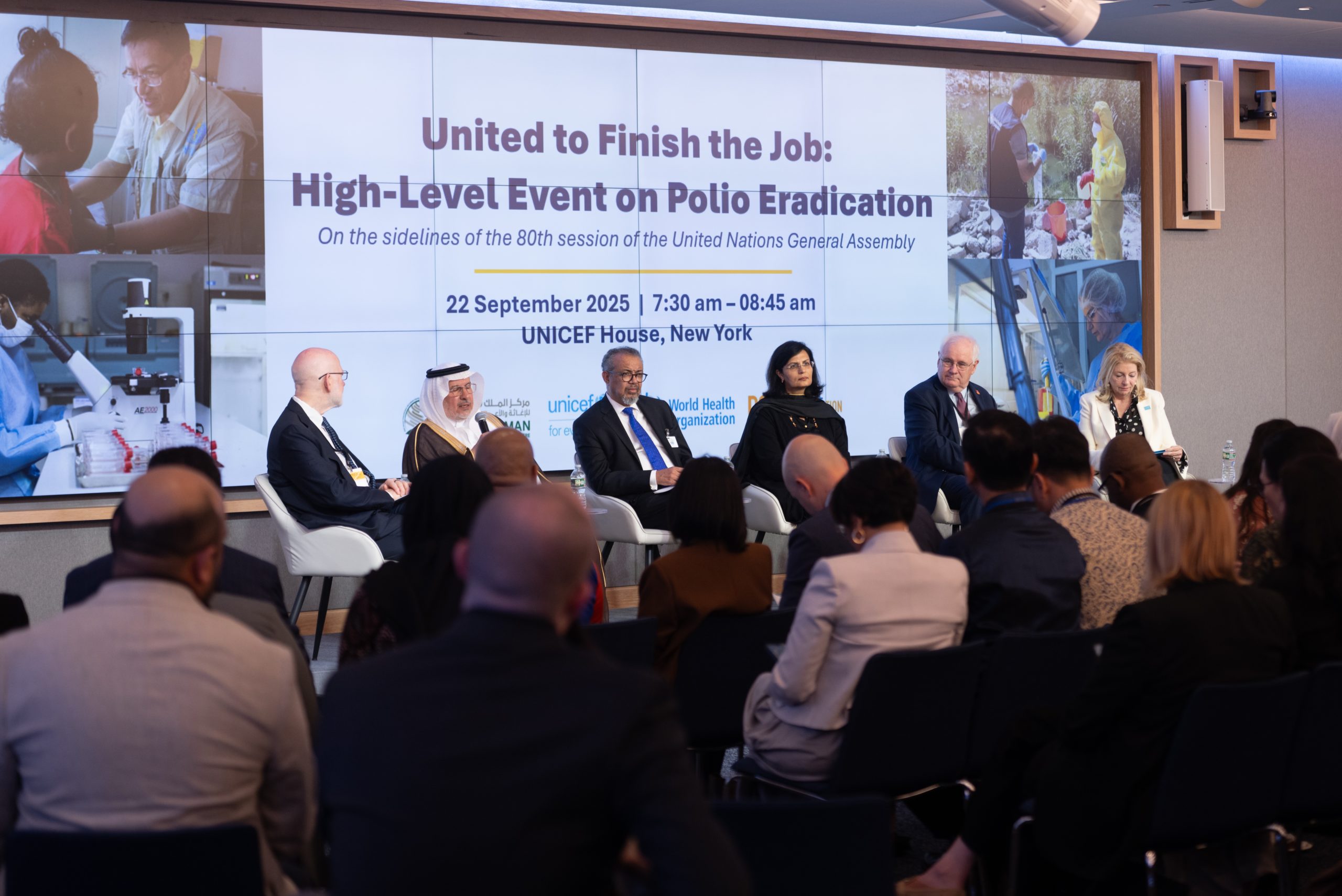NEW YORK (22 September 2025) – Senior global health leaders met today to discuss the final push to eradicate polio in a side event of the 80th United Nations General Assembly. The event, ‘United to Finish the Job: High Level Side-Event on Polio Eradication’, co-hosted by the King Salman Humanitarian Aid and Relief Centre (KSRelief), UNICEF, the World Health Organization (WHO) and the Global Polio Eradication Initiative (GPEI), addressed the urgent need to end wild polio transmission in Afghanistan and Pakistan while strengthening response to variant poliovirus outbreaks in fragile settings across Africa and Asia.
The high-level convening at UNICEF House brought together governments, international organizations and civil society representatives to share progress on the current state of global polio eradication. Participants discussed sustaining access to every child, building community trust and securing resources, even amid urgent humanitarian crises, from parts of Pakistan and Afghanistan to Somalia and Yemen.
GPEI partner leadership emphasized the importance of sustained funding to finishing the job, highlighting the Kingdom of Saudi Arabia’s US $500 million pledge to the GPEI, announced in April 2024. These and other critical donor funds are helping the partnership to reach hundreds of millions of children each year with lifesaving polio vaccines and end transmission of the virus for good.
Opening the event, H.E. Dr Abdullah bin Abdulaziz Al-Rabeeah, Supervisor General of KSRelief, underscored why this is a pivotal moment for global health and why the Kingdom helped convene leaders at the UN General Assembly. “Polio eradication is within reach, yet success depends on political will and sustained resources,” Dr. Al Rabeeah stated. “The Kingdom of Saudi Arabia is proud to stand with its partners to ensure that every child, wherever they live, is protected from a disease that should no longer threaten their future.”
Dr Tedros Adhanom Ghebreyesus, WHO Director-General, said: “Polio eradication is a shared responsibility. Since 1988 the world has dramatically reduced the burden of polio that people and communities have endured. WHO is committed to continuing to help countries detect, respond to and prevent the virus. We can finish the job only through sustained collaboration and commitment from donors such as the Kingdom of Saudi Arabia, which has been an essential supporter through its critical political, social, technical and financial contributions.”
Reaching every child still hinges on trust and reliable delivery in challenging contexts. Catherine Russell, UNICEF Executive Director, said: “Protecting children means working with communities, keeping vaccine supply dependable and reaching children everywhere, including children living in areas of conflict and crises,” said UNICEF Executive Director, Catherine Russell. “With support from extraordinary partners, including the Kingdom of Saudi Arabia, we can keep children safe today and secure a polio-free future.”

The gathering also brought together long-standing supporters, new donors, leaders from polio-affected countries and advocates to reaffirm shared responsibility for eradication. Participants heard compelling insights from speakers from Pakistan, Afghanistan, Nigeria and Indonesia, alongside representatives of the Mohamed bin Zayed Foundation for Humanity and the European Commission.
The GPEI partnership has already prevented more than 20 million cases of paralysis and more than 1.5 million childhood deaths since 1988, reducing wild poliovirus incidence by 99.9 percent. Success would make polio only the second human disease ever eradicated, after smallpox in 1979.
Additional partner quotes:
Dr Chris Elias, Chair of the Polio Oversight Board and President of Global Development at the Gates Foundation: “The partnership model works. It has carried us from hundreds of thousands of paralyzed children each year to the edge of eradication. To finish the job, we need predictable funding, consistent access to immunize children, and continued political leadership and today’s gathering is about making that possible.”
Dr Sania Nishtar, Chief Executive Officer of Gavi, the Vaccine Alliance: “Polio eradication and routine immunization go hand in hand. Strong primary immunisation keeps children healthy and prevents the virus from resurging. As a core GPEI partner, Gavi remains committed to supporting polio eradication efforts through investments in IPV and hexavalent vaccines and strengthening immunisation delivery to reduce the number of children missing out on life saving vaccines”
Mike McGovern, Chair of Rotary International’s International PolioPlus Committee: “Forty-six years ago, Rotarians backed a polio campaign in the Philippines and decided they would not stop there. What began as an ambitious dream has become one of the largest public health efforts in history. Rotarians still work alongside health workers, communities and governments every day to help protect every last child from polio. With the continued support of our partners, we can get the job done.”
For media inquiries: salhattab@unicef.org
For further information and media inquiries please contact:
ICMC@KSrelief.org
About KSrelief:
The King Salman Humanitarian Aid and Relief Centre (KSrelief), established under the guidance of the Custodian of the Two Holy Mosques, King Salman bin Abdulaziz Al Saud, represents Saudi Arabia’s commitment to global humanitarian efforts. Inaugurated in May 2015, KSrelief has provided impartial humanitarian aid and relief to over 100 countries in cooperation with local, regional, and international organizations.
Social Handles:
Twitter: @KSRelief_EN | Instagram: @KSRELIEF | LinkedIn: ksrelief | Website: www.ksrelief.org
About the Global Polio Eradication Initiative (GPEI)
The Global Polio Eradication Initiative is a public-private partnership, spearheaded by national governments, WHO, Rotary International, the US Centers for Disease Control and Prevention, UNICEF, the Gates Foundation and Gavi, the Vaccine Alliance. Since its launch in 1988, this partnership has helped prevent more than 20 million cases of paralysis, prevented more than 1.5 million childhood deaths and reduced the incidence of wild poliovirus by 99.9 percent.
